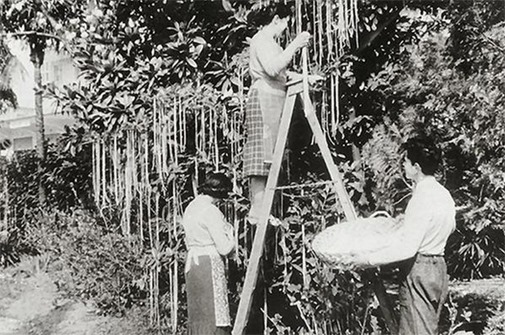The BBC has received a mixed reaction to a spoof documentary broadcast this evening about spaghetti crops in Switzerland. The hoax Panorama programme, narrated by distinguished broadcaster Richard Dimbleby, featured a family from Ticino in Switzerland carrying out their annual spaghetti harvest. It showed women carefully plucking strands of spaghetti from a tree and laying them in the sun to dry.
But some viewers failed to see the funny side of the broadcast and criticised the BBC for airing the item on what is supposed to be a serious factual programme. Others, however, were so intrigued they wanted to find out where they could purchase their very own spaghetti bush.
Exotic delicacy
 Spaghetti was not a widely-eaten food in the UK and was considered by many as an exotic delicacy. Mr Dimbleby explained how each year the end of March is a very anxious time for Spaghetti harvesters all over Europe as severe frost can impair the flavour of the spaghetti. He also explained how each strand of spaghetti always grows to the same length thanks to years of hard work by generations of growers.
Spaghetti was not a widely-eaten food in the UK and was considered by many as an exotic delicacy. Mr Dimbleby explained how each year the end of March is a very anxious time for Spaghetti harvesters all over Europe as severe frost can impair the flavour of the spaghetti. He also explained how each strand of spaghetti always grows to the same length thanks to years of hard work by generations of growers.
This is believed to be one of the first times the medium of television has been used to stage an April Fools Day hoax.
In Context
The origins of April Fools Day are not clear but it is known that the tradition of practical joking and mischief-making dates back to Ancient Roman times. It would appear that the festival is closely related to the coming of Spring.
Ancient Romans and Celts celebrated a festival of practical joking at about the time of the Vernal Equinox, as do millions of India’s Hindus. The French also mark 1 April but instead of April Fools they call it Poisson d’Avril (April Fish).
April Fool or “Aprilspøk” as we call it in Norway has a long tradition both in national radio and television. And they have pulled a few very good ones over the years – Ted
Tekst from BBC’s OnThisDay






